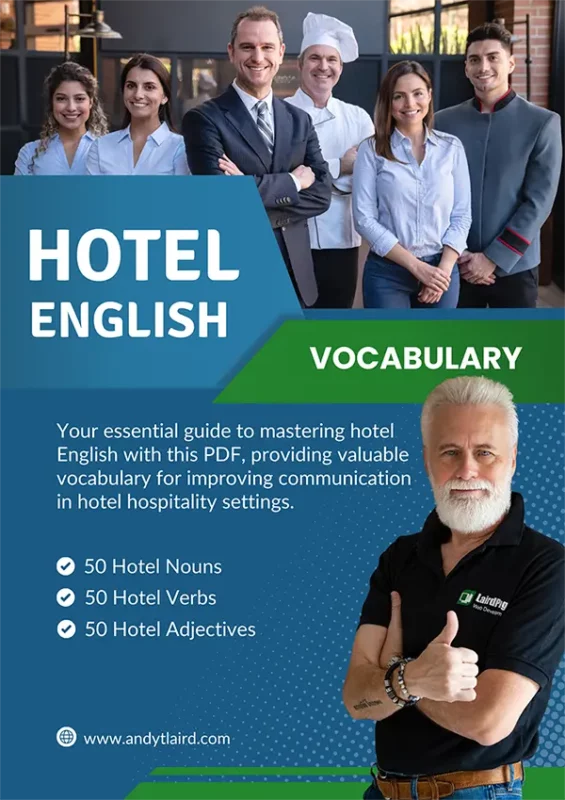When you enrol into an online course such as my Hospitality English for Hotels, you gain several advantages. They offer flexibility, allowing you to study from the comfort of your home, and access classes at your convenience. This makes it easier to integrate learning into your busy schedule. My online ‘Hospitality English Courses for Hotels‘ are also more affordable than face-to-face courses or one-on-one lessons, making them a budget-friendly option for hospitality learners like yourself.
Online courses provide the opportunity for independent study, which can be beneficial if you prefer learning alone without distractions. You’ll also have access to a wide range of resources, including interactive lessons, quizzes, and assessments, which can effectively improve your hotel English language skills in a structured and engaging manner. My online courses for Hotel Hospitality English provide you with a convenient, accessible, and cost-effective means to enhance your language skills and progress in the hotel hospitality industry.
What is Hotel Hospitality English?
Hotel Hospitality English refers to a specialised form of English language tailored for individuals working in the hospitality industry, such as hotels and restaurants. It is designed to help staff communicate effectively with guests, handle various scenarios like guest interactions, reservations, complaints, and much more. These type of English courses focuses on practical language skills needed for front-line staff to maintain good customer relations and provide excellent service. Hotel Hospitality English courses cover a wide range of topics, including meeting and greeting guests, taking orders, handling complaints, and dealing with guest requests, among others.
Common topics covered in hospitality english courses for hotels
- Customer Service Excellence: Training on delivering exceptional service, managing first impressions, and ensuring guest satisfaction.
- Hotel Communication Skills: Enhancing verbal and non-verbal communication, including active listening and clear, friendly interactions.
- Reservation and Booking Systems: Proficiency in using the hotel’s reservation software for efficient booking management.
- Problem-Solving and Complaint Handling: Strategies for effectively resolving guest issues and turning negative experiences into positive ones.
- Upselling and Cross-Selling: Techniques to promote hotel services and amenities, contributing to revenue growth.
- Time Management: Skills related to managing time effectively in housekeeping tasks.
- Hospitality Management: Insights into industry best practices, operational efficiency, financial management, guest relations, and sustainability practices.
- Hotel Sales Techniques: Advanced sales skills, market analysis, segmentation strategies, and digital marketing for hospitality.
- Leadership Development: Building essential leadership qualities such as strategic thinking, team motivation, and decision-making in the hospitality industry.
These hotel topics are essential for hotel staff to effectively communicate with guests, manage operations, provide excellent service, and contribute to the overall success in hotels.

How to Improve Your Hotel Hospitality English Skills?
From adopting the right mindset to embracing new learning strategies, each step you take brings you closer to becoming a confident communicator in the world of hotel hospitality. So, let’s dive in and learn how you can elevate your language skills! Follow these steps and strategies:
- Change your attitude: English is not a difficult language to learn, especially if you have the passion and determination to improve. Approach learning English with a positive mindset, and believe that you can achieve proficiency.
- Listen and reply: When communicating with guests, listen carefully to what they are saying before responding. This will help you understand their needs and concerns better, and enable you to provide a more personalised and effective response.
- Avoid carelessness: Be mindful of your language usage, and avoid using outdated or inappropriate words and expressions. Use polite and professional language at all times, and be respectful of your guests’ needs and preferences.
- Set a vision: Improving your English proficiency can lead to career advancement and better job opportunities. Set a goal to become proficient in English, and work towards it consistently.
- Learn from experts: Identify colleagues or professionals with strong English skills, and observe their communication style and language usage. You can also consider enrolling in English courses or hiring a tutor to help you improve.
- Use simple language: Use simple and clear language when communicating with guests. Avoid using complex words or phrases that may confuse or intimidate them.
- Stay updated: English is a constantly evolving language, with new words and expressions being added all the time. Stay up-to-date with the latest language trends and developments, and incorporate them into your communication style.
- Practice consistently: Consistent practice is key to improving your English skills. Set aside time each day to practice speaking, listening, reading, and writing in English.
- Use technology: There are many language learning apps and tools available that can help you improve your English skills. Consider using these resources to practice and reinforce your learning.
- Take advantage of opportunities: Look for opportunities to use English in real-life situations, such as attending conferences, participating in workshops, or volunteering for English-speaking events. These experiences can help you build confidence and improve your skills in a practical setting.

Effective Ways to Practice Hotel Hospitality English
To improve your English for hotel hospitality, focus on job-specific vocabulary, recognize question indicators, use online resources, practice with colleagues, take on-site training, improve speaking and listening, integrate English into daily life, and set achievable goals. The following steps will enhance communication with your guests, and boost confidence.
- Study hotel specific vocabulary: Focus on learning English words and phrases that are relevant to your specific job role and the tasks you perform. This will help you communicate more effectively with guests and colleagues.
- Practice recognising question indicators: Learn to identify the English words and phrases that indicate a question is being asked, and practice responding appropriately. This will help you handle guest inquiries and requests more effectively.
- Use online resources: Take advantage of online courses, videos, and activities that are specifically designed for hotel staff. These resources can help you improve your English language skills in a practical and engaging way.
- Practice with colleagues: Engage in English language practice sessions with your colleagues, focusing on specific scenarios and situations that you encounter in your job. This will help you build confidence and improve your communication skills.
- Take advantage of on-site training for hotels: If your hotel offers on-site English language training, take advantage of this opportunity to improve your language skills in a structured and supportive environment.
- Practice speaking and listening: Focus on improving your speaking and listening skills, as these are particularly important for effective communication in the hotel industry.
- Use English in your daily life: Practice speaking and using English in your daily life, both inside and outside of work. This will help you become more comfortable and confident in using the language.
- Set achievable goals: Set specific and achievable goals for improving your English language skills, and track your progress over time. This will help you stay motivated and focused on your language learning journey.
Online Courses Versus Tutors in Hotel Hospitality English
Online courses are designed to provide a structured and self-paced learning experience, often with interactive lessons, quizzes, and assessments. These courses are typically more affordable than hiring a tutor and can be accessed from anywhere with an internet connection. Online courses may be insufficient in hospitality-specific contexts, but they can still help learners improve their general English language skills.
Tutors, on the other hand, offer a more personalised and interactive learning experience. Tutors can tailor lessons to the specific needs of each learner, focusing on hospitality-related vocabulary and scenarios. Tutors can also provide feedback and guidance on pronunciation, grammar, and other language skills. Tutoring may be more expensive than online courses, but it can be a more effective way to learn the language, especially for learners who prefer a more interactive and personalised learning experience.
In summary, online courses are a more affordable and self-paced option, while tutors offer a more personalised and interactive learning experience. Both approaches have their advantages and disadvantages, and learners should choose the one that best fits their learning style and goals.

Advantages of Online Hospitality English Courses for Hotels
My online courses for Hotel Hospitality English offer key advantages. They provide flexibility, allowing you to study at your own pace and convenience. They are cost-effective and eliminate the need for travel. With diverse perspectives and interactive learning, you’ll enrich your experience. Access to up-to-date content ensures you’re equipped with relevant skills. Networking opportunities and self-paced learning further enhance your experience.
- Flexibility: Online courses allow learners to study at their own pace and schedule, providing the flexibility to balance work and learning commitments effectively
- Convenience: Learners can access course materials anytime and anywhere with an internet connection, eliminating the need for travel and accommodation associated with traditional classroom learning
- Cost-effective: Online courses are often more affordable than traditional classroom-based programs, helping learners save money on tuition fees, travel, and other expenses
- Diverse perspectives: Online courses expose learners to diverse perspectives and experiences from instructors and peers from different countries, enriching the learning experience and broadening networks
- Interactive learning: Online courses use engaging and interactive methods to help learners grasp concepts effectively, making the learning process more dynamic and enjoyable
- Up-to-date content: Online courses provide access to up-to-date content and help develop essential skills relevant to the hospitality industry, ensuring learners are equipped with the latest knowledge and practices
- Networking opportunities: Online courses from reputable institutions offer networking opportunities with instructors and peers, allowing learners to make connections that can benefit their careers in the future.
- Self-paced learning: Online courses allow learners to progress at their own speed, ensuring they have enough time to understand and process the course content effectively
Taking my online courses for Hotel Hospitality English offers a convenient, accessible, and effective way to enhance your language skills and advance in the hospitality industry.
How do Hospitality English Courses for Hotels differ from General English Courses?
Hotel Hospitality English courses differ from general English courses in that they focus specifically on the language skills needed for working in the hotel industry. These courses cover topics such as customer service, reservations, housekeeping, and communication, with an emphasis on practical language use in real-world situations.
For example, a Hospitality English course for hotels may include lessons on how to handle customer complaints, how to take reservations, or how to communicate with guests who do not speak the same language. These courses may also cover cultural differences and how to provide excellent customer service in a hotel setting.
In contrast, general English courses may cover a broader range of language skills, such as grammar, vocabulary, and pronunciation, without a specific focus on the hospitality industry. While these skills are important for effective communication in any setting, they may not be as directly applicable to the specific needs of hotel staff such as housekeeping hospitality English!
Conclusion
Overall, Hospitality English courses for hotels are designed to provide hotel staff with the language skills and knowledge required to provide excellent customer service and communicate effectively with guests. This makes them an important investment for hotels looking to improve their guest experience and reputation.


